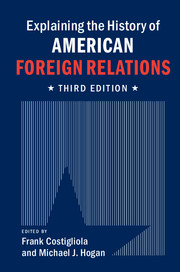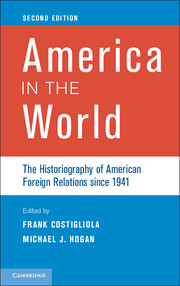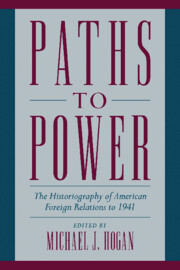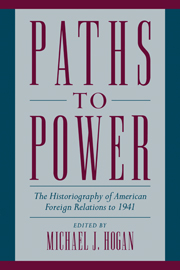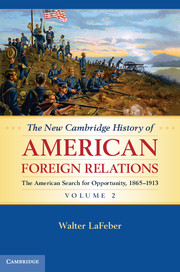Explaining the History of American Foreign Relations
A longtime classic in its first and second editions, Explaining the History of American Foreign Relations, 3rd edition presents substantially revised and new essays on traditional themes such as national security, corporatism, borderlands history, and international relations theory. The book also highlights such innovative conceptual approaches and analytical methods as computational analysis, symbolic borders, modernization and technopolitics, nationalism, non-state actors, domestic politics, exceptionalism, legal history, nation branding, gender, race, political economy, memory, psychology, emotions, and the senses. Each chapter is written by a highly respected scholar in the field, many of whom have risen to prominence since the second edition's publication. This collection is an indispensable volume for teachers and students in foreign relations history, international relations history, and political science. The essays are written in accessible, jargon-free prose, thus also making the book appropriate for general readers seeking an introduction to history and political science.
- Completely revised and updated edition
- Written by top scholars in foreign/international relations history
- Essays provide how-to suggestions for innovative analysis
Reviews & endorsements
'The third edition of this very useful volume is a welcome sight.' Carol C. Chin, H-Diplo
'Historians of American foreign relations owe a debt of gratitude to the editors of the third volume of Explaining the History of American Foreign Relations and to the many scholars who contributed to the book. The collection admirably demonstrates the methodological and theoretical vibrancy of the field, and it does so by presenting cogent introductions to a wide array of interpretive approaches. Seasoned scholars and novices alike will benefit from the informed discussions of past and present perspectives, the rich historiographic treatments that inform articles, and the copious footnotes that guide readers to further scholarship.' Deborah Kisatsky, H-Diplo
'… there is little doubt that Explaining deserves to remain among the very first books that incoming graduate cohorts read and discuss … It serves well as an inspection of our field's toolbox - leaving up to the collective readership now and tomorrow to decide what it will be used to build.' Jason Parker, H-Diplo
'The Explaining the History of American Foreign Relations experiment, begun in 1991, remains a useful and unique work of scholarship - part reference work, part historiographical overview, part methodological primer, part history of the field as a whole - but more than just a 'state of the field' collection.' Molly M. Wood, H-Diplo
Product details
March 2016Hardback
9781107054189
390 pages
235 × 157 × 25 mm
0.7kg
5 b/w illus.
Available
Table of Contents
- Introduction Frank Costigliola and Michael J. Hogan
- 1. Theories of international relations Robert Jervis
- 2. National security Melvyn P. Leffler
- 3. Corporatism: from the new era to the age of development Michael J. Hogan
- 4. Explaining political economy Brad Simpson
- 5. Diplomatic history after the Big Bang: using computational methods to explore the infinite archive David Allen and Matthew Connelly
- 6. Development and technopolitics Nick Cullather
- 7. Nonstate actors Barbara Keys
- 8. Legal history as foreign relations history Mary L. Dudziak
- 9. Domestic politics Fredrik Logevall
- 10. Global frontier: comparative history and the frontier-borderlands approach Nathan Citino
- 11. Crossing borders Emily S. Rosenberg
- 12. The privilege of acting upon others: the Middle Eastern exception to anti-exceptionalist histories of the US and the world Ussama Makdisi
- 13. Nationalism as an umbrella-ideology Michael H. Hunt
- 14. Nation branding Jessica C. E. Gienow-Hecht
- 15. Shades of sovereignty: racialized power, the United States, and the world Paul A. Kramer
- 16. Gendering American foreign relations Judy Tzu-Chun Wu
- 17. The religious turn in diplomatic history Andrew Preston
- 18. The senses Andrew J. Rotter
- 19. Psychology Richard H. Immerman and Lori Helene Gronich
- 20. Reading for emotion Frank Costigliola.

